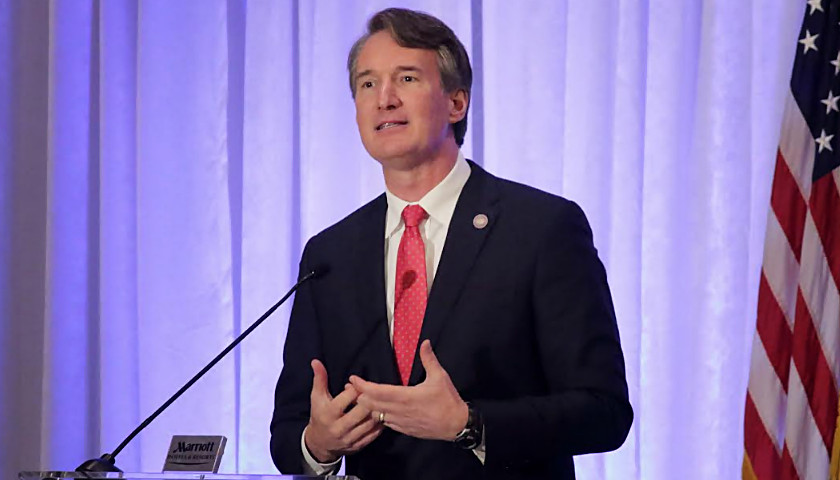RICHMOND, Virginia – Governor Glenn Youngkin told attendees at the Virginia Governor’s Conference on Agricultural Trade that Virginia’s agriculture and forestry industries are key to his goal to have Virginia win in competition with other states.
“I have already put all the other governors on notice. We’re here to win. We’re here to win in all respects. We’re here to grow jobs. We’re here to keep Virginians here. We’re here to have people from your state move to our state. We’re here for international markets to actually see Virginia’s products as best in the world. And as part of all that, just so you know, you have an enthusiastic, engaged, fully-energized chief marketing officer in your governor,” Youngkin said.
He said his oft-repeated policies including lowered taxes, improved education, and reduced regulatory burdens will help grow jobs and business in Virginia, creating demand that will benefit agriculture and forestry industries. That’s Virginia’s largest industry, with $91 billion of annual economic contribution and 440,000 jobs, Youngkin said.
“This is a sector that we must continue to grow and to support because it fits square into our ambitions to grow jobs, grow our economy, and grow our opportunity. One of the things that I do believe is that we have best-in-class agriculture and forestry capabilities. And all we want to do is make sure that we’re supporting all of you in this room to continue to widen the gap with so many of our competitors,” he said.
Youngkin spoke on Tuesday during lunchtime to a group of Virginia agriculture, forestry, and export industry leaders, students, and representatives from foreign embassies including Germany, Japan, and China. He touted the project to widen the Norfolk channel allowing better access to ports – a “giant asset of Virginia.” He said Virginia has an aggressive international agriculture and forestry marketing program, working to engage foreign buyers.
He focused specifically on opportunities in the United Arab Emirates, which could lead to expanded Virginia imports to other countries in the region.
“They import from the United States $1.2 billion a year in agriculture and forestry products and Virginia only represents $21 million of $1.2 billion,” he said. “This is a big opportunity for us. In the region, when we actually see all of the free trade agreements that we have in the region, we can in fact grow further.”
He also highlighted the importance of students to the forestry and agriculture industries.
“It’s a time where we see jobs and population movements that are moving kind of more towards urban areas. It’s a time when we see the average age of our farmers creeping up and up and up,” Youngkin said.
He concluded, “What we’re working on together is to make farming, forestry, ranching more economically viable for this next generation, recognizing the importance of creating and sustaining markets for your products and your goods.”
Other sessions included an update on trade and domestic policy, adapting to mega-droughts, an update on the Phase One Trade Agreement with China, a presentation from Port of Virginia officials about supply chains, and two sessions looking at how Russia’s invasion of Ukraine is impacting trade and agriculture.
Russian Invasion Impacts on Agriculture
Global Situation Room President Brett Bruen told attendees that Russian President Vladimir Putin threw out the rulebook, ignoring a fundamental principle of not invading countries without a pretext.
“That’s going to have reverberations across markets, across industries. What other rules could just be tossed out by leaders who find them no longer convenient? Remember again, the notion: post-American world where standards, perhaps, aren’t as strong as they were before,” Bruen said.
He advised attendees to challenge assumptions and look for vulnerabilities in their supply chains, highlighting the unforeseen impacts of the pandemic and Russia’s actions. Bruen told attendees to take action by developing relationships with diplomatic officials at the conference.
“You need those relationships to navigate these times. You also need to diversify your markets,” he said.
“Amidst this upheaval, there are new markets being created. There are new opportunities to seize,” Bruen concluded.
American Farm Bureau Federation Senior Economist Veronica Nigh said that the war and sanctions from the international community would affect both agriculture and energy commodities prices, and said that in the wake of sanctions, world markets are divided into two camps: those that trade with Russia and those that do not. Additionally, she warned that the war would increase scarcity of key food commodities, leading to global inflation of food prices.
“So far, USDA has us pegged at two-and-a-half to three and a half percent food inflation in 2022. Seems a little low given what we know today, when we’re looking at the so far, year-to-date up over four percent,” Nigh said. “So, while this is certainly significant in the U.S., the thing that has gotten policymakers’ attention is, of course, the impact on global food security.”
She highlighted the United Nations FAO Food Price Index.
“The overall is the green cereals, which includes, of course, corn, wheat, barley, and then the oil seeds, which is sun, rapeseed, and soybean, looking at all of those being up dramatically,” she said, adding that global food prices are up almost 19 percent compared to a year ago.
Nigh said, “So while the impacts in the U.S. are significant, and we will be paying more for food here, it’s the world’s poorest that a lot of eyes are on, and for good reason – those who are the least able to be able to pay for these price fluctuations.”
– – –
Eric Burk is a reporter at The Virginia Star and The Star News Network. Email tips to [email protected].
Photo by Eric Burk.




